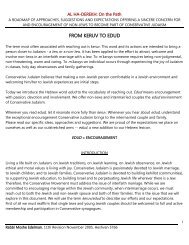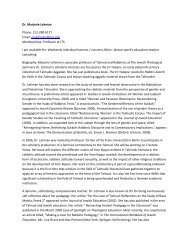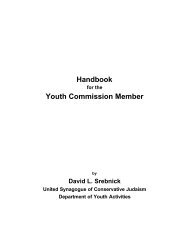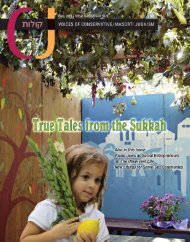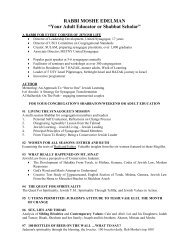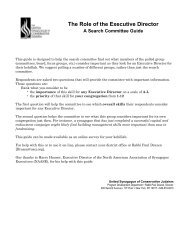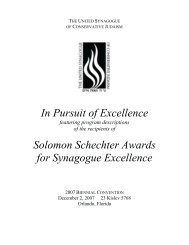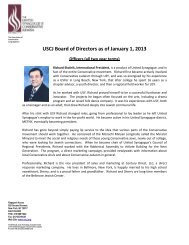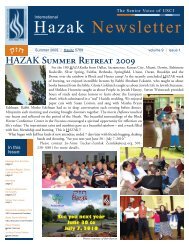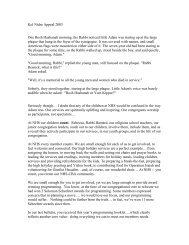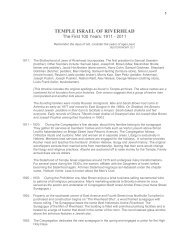Vision for Conservative Early Childhood Programs: A Journey Guide
Vision for Conservative Early Childhood Programs: A Journey Guide
Vision for Conservative Early Childhood Programs: A Journey Guide
Create successful ePaper yourself
Turn your PDF publications into a flip-book with our unique Google optimized e-Paper software.
• Celebrate and acknowledge life-cycle events – birth, brit (ritual circumcision),<br />
baby-naming, bar or bat mitzvah, weddings, funerals.<br />
• Do mitzvot – call a school friend who is sick, visit seniors in retirement homes to<br />
celebrate Jewish holidays with them. Give tzedakah – visit food pantries. Take<br />
care of the earth – plant trees. Be connected to the community. Keep the<br />
connection to God – we are doing what God asks of us. How does it make you<br />
feel when you do these things? How does it make the recipients feel?<br />
• Shirley Newman teaches about “discovering God’s secrets” (Wachs, 1998). She<br />
suggests having children collect leaves that at first glance seem to be exactly the<br />
same. As the children examine the leaves, they will discover that no leaf is<br />
identical to any other leaf. Then show the children a sheet of postage stamps or a<br />
stack of matching postcards. When they look closely, the children will discover<br />
that these human-made things all are identical. The children have just discovered<br />
one of God’s secrets – a special ability unique to God. When people make things<br />
with machines, they all come out the same. When God makes things in nature, not<br />
one is the same. The question then becomes, “Why did God do that?”<br />
• When children ask where God is, or how we know God exists if we can’t see<br />
God, take a glass of water and some sugar. Let the children taste the plain water.<br />
Put the sugar in the water and let the children stir it until all the sugar dissolves<br />
and they can no longer see it, and then let them taste the sugar water. Can they tell<br />
that the sugar is in the water, even though they can’t see it? It is just the same with<br />
God. We can find evidence of God in the world even if we can’t see God.<br />
The easiest, and also the hardest, way to help children explore their questions about God<br />
is to make God-talk a regular, normal part of the<br />
classroom. Rabbi Gordis tells us that God-talk is not<br />
teaching our children anything factual. “Rather, Godtalk<br />
is about making our children com<strong>for</strong>table with the<br />
word ‘God’ as a part of their regular vocabulary.” If<br />
teachers refer to God in a com<strong>for</strong>table, regular manner<br />
– “Let’s thank God be<strong>for</strong>e we eat our snack.” “Why do<br />
you think God made the animals talk differently than<br />
we do?” “Did God build this table? How did God help<br />
build this table?” – then the children will know then<br />
<br />
'$ " ( <br />
) ( ) *<br />
+ % +<br />
+ !<br />
<br />
,<br />
that it is safe <strong>for</strong> them to talk about God and to explore their own understandings of God.<br />
<br />
God and Spirituality Concepts<br />
A child’s relationship to God will change drastically with age. Although most children do<br />
not start asking questions about God until they are around 4, there are many ways to<br />
infuse the classroom with God concepts from the earliest age. Following is a list of<br />
appropriate God-concepts <strong>for</strong> every age. Each age group is built on the previous one. For<br />
each age group there is a list of concepts the teacher should understand in order to create<br />
an atmosphere in which children can build connections to God and their own spiritual<br />
selves. There also is a list of concepts about God that children of that age understand.<br />
<strong>Vision</strong> <strong>for</strong> <strong>Conservative</strong> <strong>Early</strong> <strong>Childhood</strong> <strong>Programs</strong>: A <strong>Journey</strong> <strong>Guide</strong><br />
USCJ Department of Education<br />
Maxine Handelman<br />
Handelman@uscj.org<br />
56



